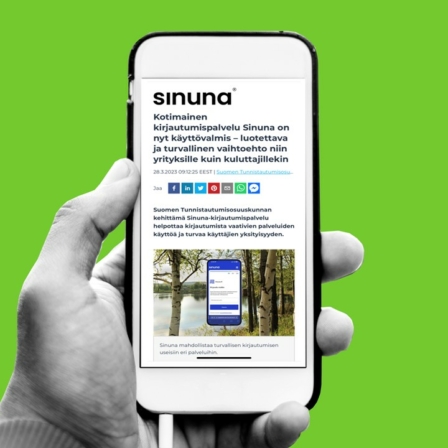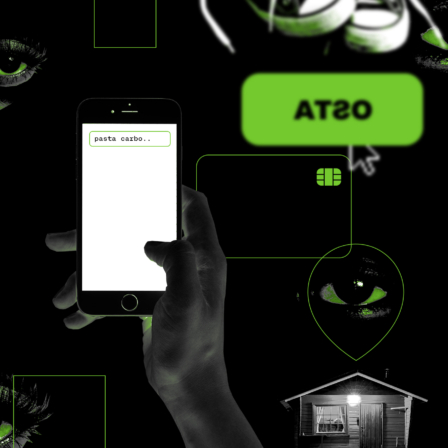Understanding of data collection and data ownership is still limited, and both lawmakers and the public need more information on the subject. It is also an important issue for democracy, as the data collected, say, by Facebook can be used to deepen tribalism and conflict in society. So say the test subjects of the Digipower investigation, MEP Sirpa Pietikäinen and MPs Markus Lohi and Tom Packalén.
In Sitra’s Digipower investigation, the test subjects will monitor the flow of data about themselves using a tracking app installed on their test phones and through e.g. data requests sent to companies and organisations. Together with their personal “data coaches,” the participants will review their data, go deeper into it, and examine, for example, the results of their data requests against set targets.
Here, Pietikäinen, Lohi and Packalén share their expectations of the project. All test subjects will be announced in November. Read also the first in this series of articles.
Sirpa Pietikäinen: “People often worry about Google or grocery chains – that’s the least of my concerns. It’s what comes next that worries me.”
I use the internet and social media to communicate and search for information. In everyday life you get these “Google it” situations where you have to check stuff or search for information. For example, I check information about the background organisations of the speakers taking part in the same seminar or Commission’s programmes. I don’t use social media that much in my free time. At work I use e-mail, Twitter, WhatsApp, the main news media, and at the weekend I gaze out the window – it’s not a pain to be without social media. I use the internet less and differently in my free time – I don’t order bathroom tiles during working hours.
Data is collected on both ordinary people and politicians. Tracking what I buy to feed my cats, whether I have a gym card and whether I use it, which my regular routes to work are – it certainly makes quite a personality profile. I’m particularly interested in the levels of influence here – I am not bothered that much about getting more cat food than dog food ads. But it can have big and surprising consequences if all your personal data ends up in hostile third-party hands, such as terrorists. Some shops may use the data for perfectly good purposes, but what if the data is sold or leaked? Who is it sold to, and how is it accumulated and distributed?
To my mind, the process of data collection and ownership is still in its infancy and will probably continue to be. Hopefully, this project will teach me and other lawmakers how it should be developed. It would be important to know more about how artificial intelligence works and where the so-called black boxes are. Could a hostile state start trolling, say, female politicians who are feminists? For example, hate campaigns against sexual minorities, anti-vaccine attitudes and climate scepticism – how are conspiracy theories targeted and where does that data disappear to?
What’s appropriate in the real world is appropriate in the artificial intelligence world. Many people are sceptical about targeting. I don’t like online advertising, it is irritating, but I would not ban or restrict it. There are also certain rules when you sell addresses – you must have the right to say no and know that the address source exists. It’s a problem when this information gets leaked to third parties that can use it for totally different purposes and link it, say with health data. This will require more detailed marketing regulation in the future.
Markus Lohi: “Data collection is a fairly new phenomenon that can have profound impacts. Perhaps we will only notice these after some delay.”
I follow different media online and communicate about my work. I also use the internet for various kinds of information searches and to some extent to buy different products and services, such as booking hotels and so on. I also use social media to discuss current political issues.
My use of social media is focused mainly on my work. Leisure and work use go hand in hand. The line between them is totally blurred at times. That’s why I never, say, publish even identifiable photos of my children even on my private accounts.
My knowledge of all the data collected about me is in the end quite limited. In the absence of this information, it is also difficult to estimate how I am being influenced or attempted to be influenced. What I do know is that data is being collected and also being used for various purposes with the help of artificial intelligence.
Data collection is a fairly new phenomenon that can have profound impacts. Perhaps we will only notice these after some delay. It’s therefore important to analyse the phenomenon and its different aspects and share information about it. We have European regulation and complementary domestic legislation. The real impact and how these standards are applied, for instance by global players, for example, remains obscure.
The potential for influence through data is greater than many of us realise. What makes it so powerful in its own way is that the target of the influence may not even be aware of the ways and means by which it is being exerted.
Tom Packalén: “The GDPR is a fiasco.”
I use the internet and social media especially for reading the news. I mainly use Facebook, messaging and other services, such as streaming services. I use connected digital channels both for work and leisure, and of course the boundary between them is vague.
At the start of this project, data collection for me is mainly about targeted advertising that serves me. On the other hand, I am worried about the use of Facebook data and especially the bubbles it creates. The use of Facebook data leads to tribalism and conflicts, both in society and in the world.
My view of the legislation on data collection and ownership is that the GDPR, for example, is a fiasco. The benefits of influencing through data are major, but so are the risks.
Social and digital media influence our thinking on a daily basis, sometimes distorting the truth. Sitra’s Digipower investigation tracks the journey of 15 leading influencers and their own data and shows what happens to their data and how data becomes power. The results of the project will be published in early 2022.













Read more